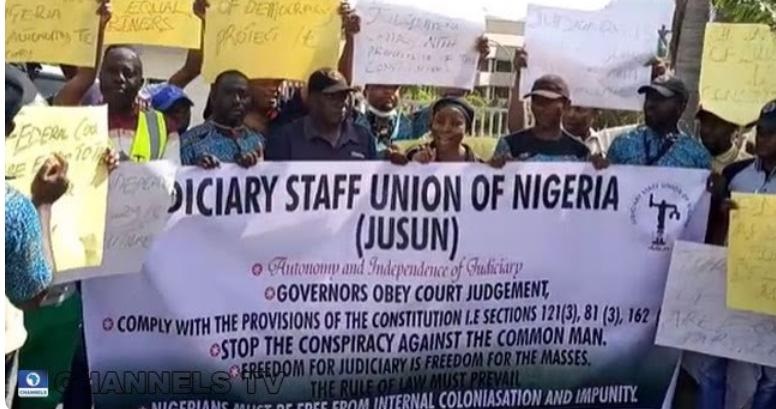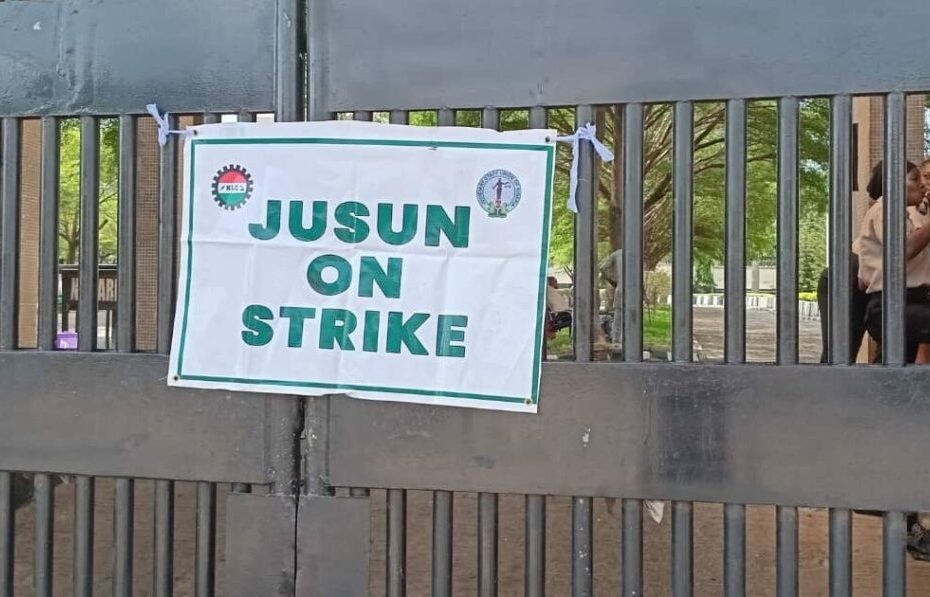As of June 3, 2025, the Judiciary Staff Union of Nigeria (JUSUN) Federal Capital Territory (FCT) chapter continues its industrial action, which began on June 1.
In a statement released by JUSUN/FCT/HC/Chapter, the union called on colleagues to disregard any post, message, or rumour about the strike being called off.
It stated that “such information was false, misleading, and does not represent the position of the union”.
The union encouraged members to remain at home and stay off duty, until officially directed to do otherwise by the union’s leadership.
The statement further read,
“We are fully aware of the situation and will communicate any updates through the proper channels.
“This is a critical time for our struggle, and discipline is key.
“Do not allow confusion or misinformation to derail our collective effort.
“Remain calm, stay united, and await further directives.”
The strike has brought judicial activities to a standstill across the FCT.
This is reportedly affecting major legal institutions such as the Court of Appeal and various High Courts located in Maitama, Wuse, Garki, and Nyanya.
This latest strike action follows a directive issued by JUSUN’s national leadership, prompted by the federal government’s persistent failure to address long-standing demands made by judicial workers.

Background and Union Demands
JUSUN’s grievances center around several unresolved issues that have persisted despite repeated negotiations and commitments from the government.
The union is demanding the immediate payment of a five-month wage award that has yet to be disbursed.
In addition, they are calling for the implementation of the ₦70,000 national minimum wage specifically tailored for judicial staff.
Also, they are calling for the enforcement of salary increments of 25% and 35% under the Consolidated Judiciary Salary Structure (CONJUSS).
These demands reflect both economic concerns and the broader issue of ensuring equitable compensation within the judiciary.
Effect on Judicial Operations
The strike has significantly disrupted the judicial system within the FCT.
Courtrooms have remained closed since June 1.
Union members have actively enforced the shutdown by locking court gates and barring entry to judicial staff, legal practitioners, and members of the public.
As a result, judges have been unable to sit, legal proceedings have been halted, and litigants have been left stranded.
The ripple effect of this paralysis in the judiciary is being felt across the region.
However, despite the widespread disruption, it has been reported that operations at the Supreme Court and the National Judicial Council (NJC) have continued unaffected.
This is possibly due to their federal status and administrative arrangements.
Government Engagement and Negotiations
The federal government has initiated dialogue with JUSUN representatives in an attempt to bring an end to the strike.
There are indications that some progress has been made, particularly with discussions regarding the payment of the outstanding wage award.
On the other hand, a full agreement has yet to be reached.
JUSUN remains firm in its position that only verifiable and tangible actions, such as the direct remittance of funds allocated to the judiciary, will be sufficient to consider suspending the strike.
The union has expressed skepticism toward mere promises or partial concessions and is demanding the full implementation of prior agreements before it reopens the courts.
Broader Significance and Implications
This prolonged strike highlights deeper structural issues within Nigeria’s judicial system.
Notably among them is the ongoing struggle for financial autonomy and the lack of implementation of agreed-upon policies for judicial welfare.
The inability of the government to meet the union’s demands not only undermines worker morale but also disrupts the entire legal framework.
Litigants are left without access to justice, lawyers are unable to represent their clients in court.
Also, pending cases continue to accumulate, worsening the judicial backlog.
Furthermore, the situation serves as a stark reminder of the fragility of Nigeria’s institutional infrastructure and the urgent need for systemic reform in how judicial funding and labor relations are managed.
Without decisive intervention, there is a growing risk of eroding public confidence in the legal system.
The Path Forward
As discussions between JUSUN and the government continue, the resolution of the union’s demands remains critical for restoring order in the FCT’s judicial system.
Addressing these issues goes beyond settling a labor dispute, it is essential to upholding the rule of law and ensuring that Nigeria’s courts can function effectively.
Both parties are under pressure to reach a sustainable agreement that respects workers’ rights while preserving the integrity and continuity of judicial services across the capital and, potentially, other parts of the country.



